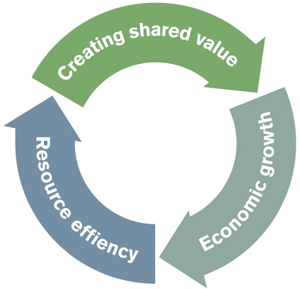According to COMM 101 Lecture 15, the goal of creating a shared value is to expand the total pool of economic and social value. In the other words, a company in which creates shared value not only earns profit but also increases social benefits in return. Let’s take TOMS Shoes as an example. In Jessica’s blog post, she discusses about TOMS’s efforts to provide benefits to society by “producing good quality shoes made from recycled materials and offering more than 100 new jobs in Haiti”(par.2). By doing so, TOMS is leading its way to sustainability.

I totally agree with Jessica that TOMS contributes to improve economic welfare (par.3) because TOMS has taken environment into its considerations when producing environmental-friendly shoes. Moreover, hiring local artisans in Haiti to express their local culture and talents provides social value because it promotes the Haitian culture worldwide.
Similarly, in the article “Innovating For Shared Value-Harvard Business Review“, there are many other companies that creates shared value. For example, Dow Chemical adds Nexera canola and sunflower seeds to its products, which “removes 600 million kilogram of trans fats and saturated fats from the U.S. diet”. In addition, “Novartis provided essential medicines and health services to 42 million people in India(par.4)”
I think shared value allows a company and society to receive mutual benefits, which develops sustainability in the long run.
References:
- Jessica Sanantha’s Blog: Innovating For Shared Value-Harvard Business Review. Sat.17 Nov.2013. <https://blogs.ubc.ca/jessicasanantha/2013/10/31/toms-continues-to-strive-for-created-shared-value/>
Images:

